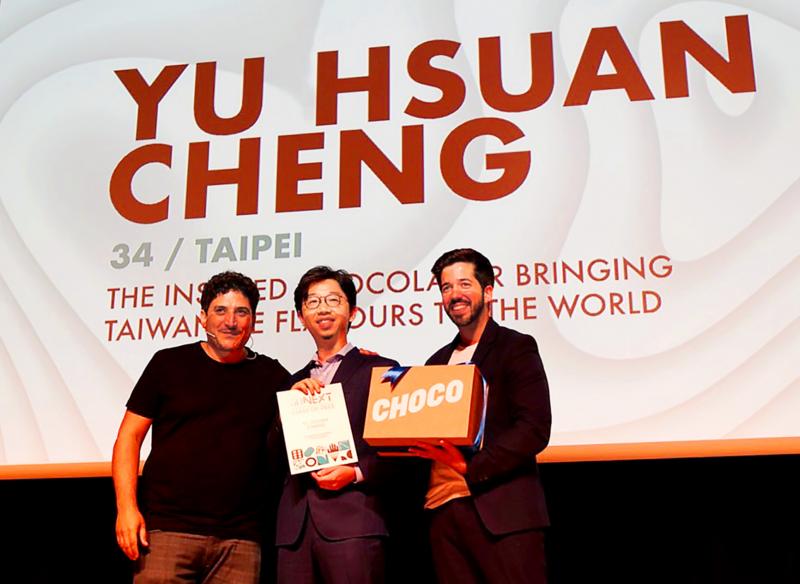Cheng Yu-hsuan (鄭畬軒) has become the first Taiwanese chocolatier to be included on 50 Next’s list of 50 Gamechanging Producers, which honors “farmers, artisans, and makers powering the supply chain in innovative ways.”
Cheng was ranked No. 34 for developing a “sustainable model for the chocolate and pastry industry in Taiwan, sourcing his ingredients responsibly and improving worker conditions in terms of salary and working hours,” the organization said.
Cheng founded his company, Yu Chocolatier (畬室巧克力), in 2015.

Photo courtesy of Yu Chocolatier via CNA
“As a creator of taste, I believe it is our duty to foresee the unimaginable, to explore the unknown,” Cheng says in his profile on the Next 50 Web site. “People can only decide if they like a taste or not once they have tasted it. It is up to us, the innovators, to imagine and realize the never-ending explorations of the human mind.”
In his acceptance speech at Friday’s ceremony at the Palacio Euskalduna in Bilbao, Spain, Cheng said he fully recognized how many people were supportive of his native culture, and that he was grateful to be able to imbue his creations with the flavors of Taiwan.
Cheng was born in Tainan and his family moved to Texas when he was a child. Returning to Taiwan for university in 2007, he dropped out to pursue a career as a chocolatier.
“I still remember my first bite of decent chocolate — a fruity, Madagascan dark chocolate,” Cheng’s profile says. “That experience has been echoing throughout my entire career.”
After dedicating a few years to teaching himself how to make chocolate, he moved to Paris to study at the Ferrandi school and interned at Alleno Paris au Pavillon Ledoyen.
Cheng’s company has received international recognition, and he was the only Taiwanese chocolatier invited to the Salon du Chocolat Paris, one of the world’s most renowned chocolate expositions.
His success also prompted him to write a book about his time in France, with plans under way to open a shop in Paris.
50 Next is an annual series of lists compiled since last year by the creators of The World’s 50 Best Restaurants and Spain’s renowned Basque Culinary Center.
The curators select 50 individuals to be featured in each of its seven categories, including Tech Disruptors, Empowering Educators, Entrepreneurial Creatives, Science Innovators, Hospitality Pioneers, Trailblazing Activists and Gamechanging Producers.

SEMICONDUCTORS: The German laser and plasma generator company will expand its local services as its specialized offerings support Taiwan’s semiconductor industries Trumpf SE + Co KG, a global leader in supplying laser technology and plasma generators used in chip production, is expanding its investments in Taiwan in an effort to deeply integrate into the global semiconductor supply chain in the pursuit of growth. The company, headquartered in Ditzingen, Germany, has invested significantly in a newly inaugurated regional technical center for plasma generators in Taoyuan, its latest expansion in Taiwan after being engaged in various industries for more than 25 years. The center, the first of its kind Trumpf built outside Germany, aims to serve customers from Taiwan, Japan, Southeast Asia and South Korea,

Nvidia Corp chief executive officer Jensen Huang (黃仁勳) on Monday introduced the company’s latest supercomputer platform, featuring six new chips made by Taiwan Semiconductor Manufacturing Co (TSMC, 台積電), saying that it is now “in full production.” “If Vera Rubin is going to be in time for this year, it must be in production by now, and so, today I can tell you that Vera Rubin is in full production,” Huang said during his keynote speech at CES in Las Vegas. The rollout of six concurrent chips for Vera Rubin — the company’s next-generation artificial intelligence (AI) computing platform — marks a strategic

Gasoline and diesel prices at domestic fuel stations are to fall NT$0.2 per liter this week, down for a second consecutive week, CPC Corp, Taiwan (台灣中油) and Formosa Petrochemical Corp (台塑石化) announced yesterday. Effective today, gasoline prices at CPC and Formosa stations are to drop to NT$26.4, NT$27.9 and NT$29.9 per liter for 92, 95 and 98-octane unleaded gasoline respectively, the companies said in separate statements. The price of premium diesel is to fall to NT$24.8 per liter at CPC stations and NT$24.6 at Formosa pumps, they said. The price adjustments came even as international crude oil prices rose last week, as traders

PRECEDENTED TIMES: In news that surely does not shock, AI and tech exports drove a banner for exports last year as Taiwan’s economic growth experienced a flood tide Taiwan’s exports delivered a blockbuster finish to last year with last month’s shipments rising at the second-highest pace on record as demand for artificial intelligence (AI) hardware and advanced computing remained strong, the Ministry of Finance said yesterday. Exports surged 43.4 percent from a year earlier to US$62.48 billion last month, extending growth to 26 consecutive months. Imports climbed 14.9 percent to US$43.04 billion, the second-highest monthly level historically, resulting in a trade surplus of US$19.43 billion — more than double that of the year before. Department of Statistics Director-General Beatrice Tsai (蔡美娜) described the performance as “surprisingly outstanding,” forecasting export growth